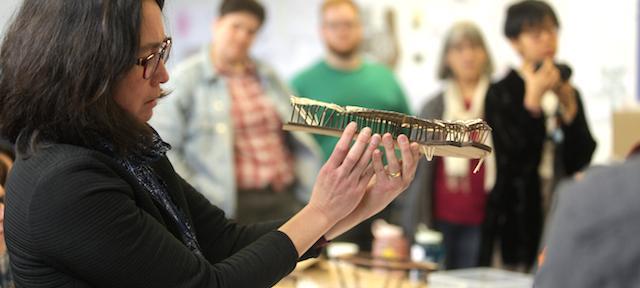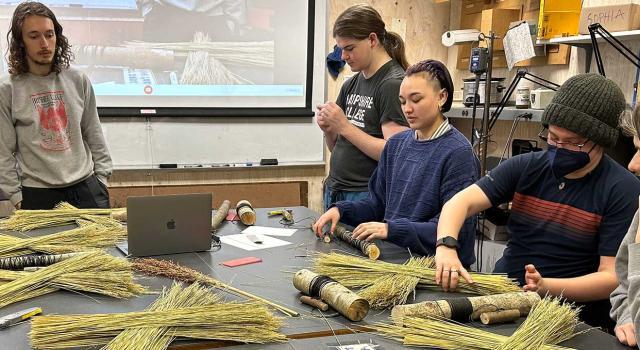Students in Yearlong Course Design Across Cultures, Study in Thailand, Collaborate Across Disciplines

A yearlong Hampshire course has students collaborating with a community agricultural organization in Thailand to design educational and social projects that will benefit farmers there and the village at large.
Fourteen students — eight from Hampshire and six from Mount Holyoke —are working in partnership with the Thai nonprofit Joko Community Learning Centre, based in Nan, as a component of “Designing for Life: Agriculture, Ecology, and Design in Northern Thailand.” Joko serves Nan Province farmers by giving them agency to represent themselves, helping them maximize crop yields and sustainability, and avoid being exploited by the government or large multinational corporations.
After seven months of intensive coursework, which included three weeks of field study in Thailand, the student teams, from a range of disciplines, are proposing to collaborate with their Thai partners to make:
- a roadside market where farmers can sell their produce
- new education facilities with garden spaces where farmers and community members can learn through experience and interaction
- a film documenting and promoting this unique model of collaboration across cultures and across disciplines so it might be replicated elsewhere
“One of our goals is to help the farmers shift from cash crops to more-sustainable farming methods,” says Sue Darlington, dean of Hampshire’s School of Critical Social Inquiry and professor of anthropology and Asian studies. She is co-teaching the September–May course with Naomi Darling, Five College assistant professor of sustainable design.
It’s rare for undergraduates to have the opportunity to travel overseas to see a site, meet a client group, and have the time to study so many of the larger contextual issues facing a village and its region, adds Darling. “This course is a chance for us to learn how to integrate a cultural component into sustainable design,” she says. “How do you work overseas, outside of your own culture, and develop relationships with the people you’re collaborating with? The open dialogue is the beginning of the design process.”
For three weeks in January 2018, 12 of the students, accompanied by the professors, took part in field study offered in conjunction with Hampshire’s Global Education Office. Traveling in northern Thailand and around Nan Province, the students participated in activities across disciplines:
- Meetings with professionals, farmers, faculty, and activists involved in architecture, design, ecology, agriculture, anthropology, and the history and culture of northern Thailand
- Tours of historical buildings and contemporary museums to learn about the history of Nan and see designs and approaches to building and agriculture
- Visits to farms, among them a silkworm farm, as well as a fish sanctuary and ecotourism project, house-construction sites, and art galleries
The class also visited Wat Pong Kham, a temple run by a Buddhist monk active in promoting local, sustainable agriculture and helping farmers break away from contract farming. Some of the students helped with a small building project there, expanding the length of a teak and bamboo teahouse/smokehouse with a thatch roof. The students learned a simple method of securing the thatch sections using strips of bamboo.
Central to the trip was a daylong workshop with the staff of Joko and Hak Muang Nan, a regional community organization, to identify the challenges facing farmers and conceptualize design projects and approaches that may offer solutions.
While in Thailand, the students accumulated materials to bring back to Amherst and support their projects:
- A detailed town-site plan
- Studies on the local ecology and existing vegetation
- Research on the art and aesthetics of the village and the region
- Information about religious and spiritual practices
- Reports on the politics and economy of the village and the region
Throughout Nan, the students saw spirituality expressed in homes and buildings, many of which contain ceremonial posts where residents make offerings of plants and fabrics to spirits to ensure health and well-being.
“I learned that the spirituality practiced in the village helps bring the community together,” said Quinn Thomashow, who is in her second year of studies at Hampshire. “It was really beneficial to work hands-on in a culture so different from mine. Now we’re taking the experience and hoping to do something meaningful with it.”
The course is funded in part by grants from the Luce Initiative in Asian Studies and the Environment (LIASE) and the Roddenberry Foundation, led by Hampshire alum Rod Roddenberry. Funded by the Henry Luce Foundation's Asia Program, LIASE aspires to encourage innovative approaches to Asian studies teaching and research at the undergraduate level through the lens of the environment and sustainable development. The mission of the Roddenberry Foundation is to support innovative solutions to critical global issues in the areas of science and technology, the environment, education, and humanitarian advances.
In February, Roddenberry traveled from California to visit with the class on campus and learn about the students’ projects.
This spring, the students interested in design have been working in interdisciplinary teams to develop proposals for their projects, while non-design students are delving deeper into their research.
The partnership between Hampshire and Joko has also benefited Hampshire students beyond those in the course. For the past two years, a Joko staff member has visited Hampshire as an exchange scholar. Phimonphan “Pang” Sakitram co-taught the fall-term “Designing for Life” with Darlington and Darling, and guest-lectured in several other classes, explaining how issues related to ecology, hydrology, and environmental sciences are being managed in Nan.
Says Darlington, “We’re coming away with an important understanding of the issues they’re facing in Nan as a result of climate change, economic and political policies, and social change. And we’re working together to design community solutions to these serious problems.”
GALLERY photos by students in the course and Hampshire staff



